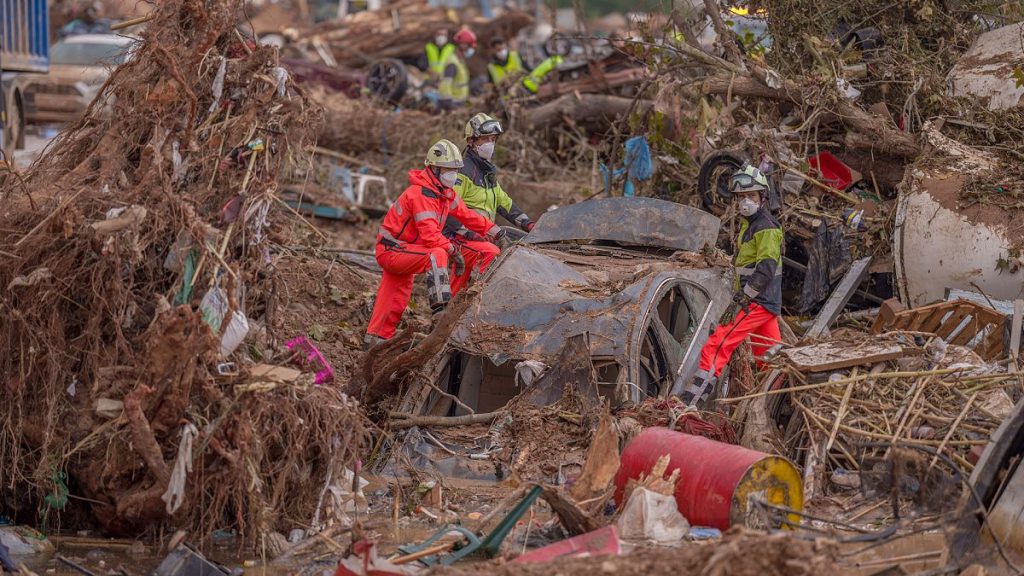Last week’s devastating floods in Valencia, Spain, resulted in over 200 deaths, with many individuals still missing. Authorities are struggling to provide an accurate estimate of the number of missing persons, leading to emotional pleas from desperate family members seeking information about their loved ones. Rescue efforts are ongoing in affected areas, with search teams scouring wrecked cars, houses, and streets for any remaining victims. The scale of destruction in the region is evident as thousands of cars lie destroyed in canals that overflowed during the floods.
In response to the disaster, emergency personnel, including soldiers, police, and firefighters, have been deployed to aid in the search and clean-up efforts. In Aldaia, a team of 50 individuals equipped with boats and wetsuits worked to search a shopping center’s flooded underground parking lot for any potential victims. Although numerous submerged vehicles have been located, no bodies have been found in the area thus far. The situation in Valencia remains critical as citizens, volunteers, and government forces continue to work together to remove debris and mud from the affected regions.
Amid the devastation, frustrations are running high among residents who feel abandoned by the authorities. This sentiment was made evident when a crowd hurled mud at Spain’s royal couple, Prime Minister Pedro Sanchez, and regional leaders during their visit to Paiporta, where over 60 people lost their lives. The lack of prompt assistance and the absence of basic necessities like drinking water have contributed to the growing anger and dissatisfaction towards those in power. The emotional toll of the disaster is significant, with survivors grappling with the loss of their homes and loved ones in the wake of the floods.
In addition to the challenges faced in Valencia, other parts of Spain have also been impacted by extreme weather conditions. A storm in eastern Spain caused relentless rain in Barcelona, leading to the suspension of commuter rail services in northeast Catalonia. Authorities issued alerts warning residents to avoid flooded areas and dry gorges to prevent further risks to public safety. The adverse weather conditions have resulted in the closure of highways and the cancellation of classes in certain regions, further adding to the disruption caused by the natural disasters in the country.
Experts attribute the severity of the recent flooding to a combination of factors, including a cut-off lower-pressure storm system and record-high temperatures in the Mediterranean Sea. These climatic conditions exacerbated the impact of the storms, leading to widespread devastation in Spain. The unprecedented nature of the floods has prompted a significant response from the Spanish government, with the deployment of military personnel, helicopters, and relief supplies to assist in the recovery efforts. The collaboration of various agencies and volunteers is crucial in addressing the immediate needs of affected communities and facilitating the recovery process in the aftermath of the disaster.
As Spain grapples with the aftermath of the catastrophic floods, the focus remains on locating missing individuals, providing essential services to survivors, and restoring normalcy to the affected regions. The resilience of the Spanish people, along with the support of emergency response teams and volunteers, will be instrumental in rebuilding communities and creating a sense of hope amidst the devastation. The lessons learned from this tragic event will serve as a reminder of the importance of preparedness and coordination in mitigating the impact of natural disasters in the future.













